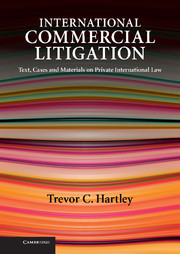Book contents
- Frontmatter
- Contents
- Table of panels
- List of figures
- Preface
- Acknowledgments
- Terminology
- Table of Latin phrases
- List of abbreviations
- Table of cases
- Table of cases (European Court of Justice, numerical order)
- Table of legislative instruments
- PART I STARTING OFF
- PART II JURISDICTION
- PART III FOREIGN JUDGMENTS
- PART IV PROCEDURE
- PART V CHOICE OF LAW
- PART VI EXTRATERRITORIALITY
- 32 Introduction to Extraterritoriality
- 33 Extraterritorial application of US antitrust law
- 34 The international response
- 35 Extraterritorial application of EC competition law
- Bibliography
- Index
34 - The international response
from PART VI - EXTRATERRITORIALITY
- Frontmatter
- Contents
- Table of panels
- List of figures
- Preface
- Acknowledgments
- Terminology
- Table of Latin phrases
- List of abbreviations
- Table of cases
- Table of cases (European Court of Justice, numerical order)
- Table of legislative instruments
- PART I STARTING OFF
- PART II JURISDICTION
- PART III FOREIGN JUDGMENTS
- PART IV PROCEDURE
- PART V CHOICE OF LAW
- PART VI EXTRATERRITORIALITY
- 32 Introduction to Extraterritoriality
- 33 Extraterritorial application of US antitrust law
- 34 The international response
- 35 Extraterritorial application of EC competition law
- Bibliography
- Index
Summary
Patents
Patents are rights granted by the State, which confer a monopoly on the rightholder. They are regarded as being an attribute of sovereignty and are often thought to be within the exclusive jurisdiction of the State conferring them. So it is hardly surprising that foreign interference is resented.
England
British Nylon Spinners v. ICI
Court of Appeal
[1953] Ch 19; [1952] 2 All ER 780
Background
ICI (Imperial Chemical Industries) was a major British company; Du Pont was a major American company. In 1946, they entered into a market-sharing agreement under which most of the world was divided up between them. They swapped patents to give effect to the agreement. The US Government subsequently brought proceedings against them before Judge Sylvester Ryan in a federal district court in the United States. The claim was that the market-sharing agreement violated the Sherman Act.
The English proceedings concerned nylon, a synthetic fibre invented by Du Pont and patented by it in both the US and the UK. As part of the market-sharing agreement, Du Pont assigned the relevant UK patents to ICI. In 1947, ICI agreed to grant an irrevocable and exclusive licence to British Nylon Spinners (BNS), a British company 50 per cent owned by ICI, and 50 per cent owned by another British company, Courtaulds. At the time, BNS knew about the antitrust aspects of the matter and it seems that the arrangement was partly entered into in order to avoid the consequences of the American proceedings.
- Type
- Chapter
- Information
- International Commercial LitigationText, Cases and Materials on Private International Law, pp. 832 - 852Publisher: Cambridge University PressPrint publication year: 2009
- 1
- Cited by



